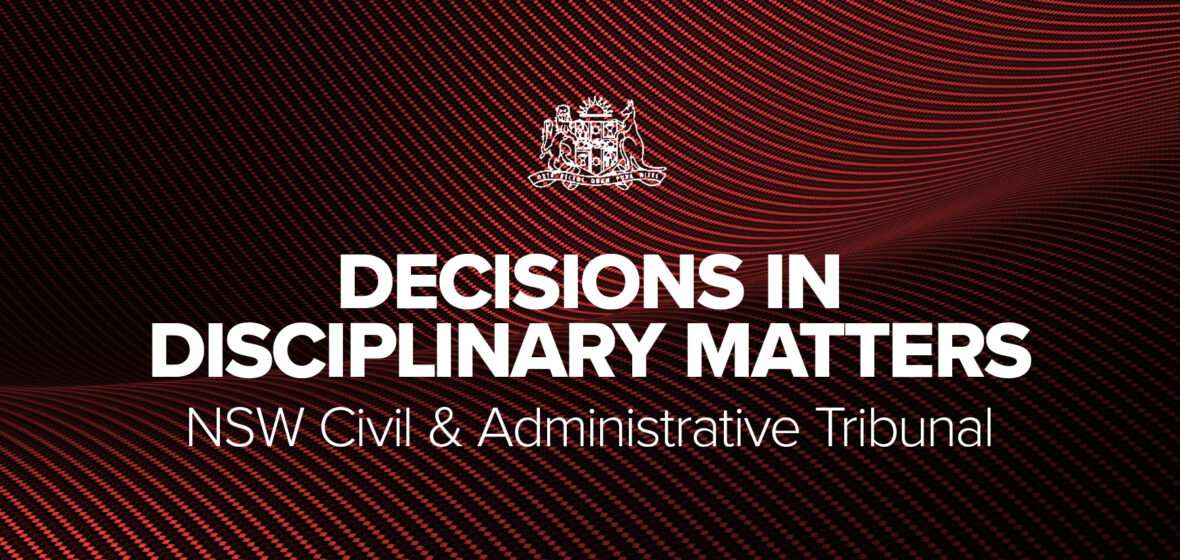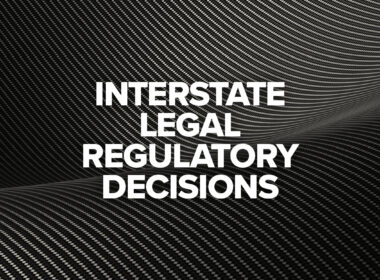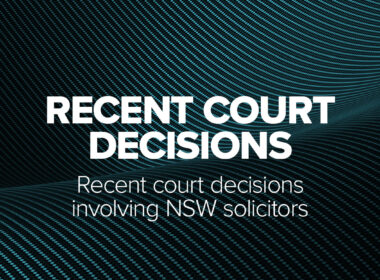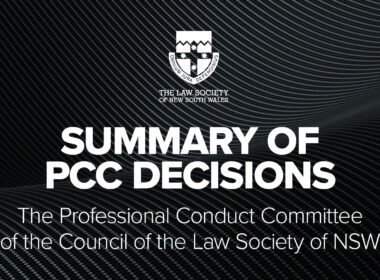Council of the Law Society of New South Wales v Lee [2024] NSWCATOD 108
Decision published: 25 July 2024
On 25 July 2024, the New South Wales Civil and Administrative Tribunal (Tribunal) published its decision in disciplinary proceedings that the Council of the Law Society of New South Wales (Council) had commenced against Ms Pei Sze Lee.
On 23 December 2022, the Council commenced disciplinary proceedings against Ms Lee in the Tribunal. In the proceedings, the Council sought a finding that Ms Lee was guilty of professional misconduct on the following grounds and the following disciplinary orders:
Grounds
- Ms Lee failed to co-operate with, and thereby obstructed, the manager appointed to the Law Practice under section 334 of the Legal Profession Uniform Law (NSW) (Uniform Law)
(Ground 1). - Ms Lee participated in the affairs of the Law Practice after service on her of a notice of appointment of the manager contrary to section 335(1) of the Uniform Law (Ground 2).
- Me Lee engaged in legal practice when she was not entitled to do so contrary to section 10 of the Uniform Law (Ground 3).
- Ms Lee engaged in legal practice without holding professional indemnity insurance (Ground 4).
- Ms Lee failed to maintain legal files to a standard of competence and diligence of a reasonably competent lawyer (Ground 5).
- Ms Lee caused a transfer to be stamped with a transaction number when she knew that duty had not been paid on the transaction, or she did not know and ought to have known whether duty had been paid on the transaction (Ground 6).
- Ms Lee caused a transfer to be stamped with a transaction number when she knew that the Declaration for ‘Off the Plan’ Purchases had not been completed, or she did not know and ought to have known whether the Declaration for ‘Off the Plan’ Purchases has been completed (Ground 7).
- Ms Lee failed to comply with a notice issued to her pursuant to section 371 of the Uniform Law (Ground 8).
Orders
- An order issuing Ms Lee with a reprimand.
- An order requiring Ms Lee to pay a fine.
- An order prohibiting any practising certificate be granted to Ms Lee until she undertakes and passes a course in practice management.
- An order prohibiting Ms Lee from applying for a practising certificate that would authorise her to be a principal of a law practice until after she had held five practising certificates in five separate practising certificate years that authorise her to engage in supervised legal practice only.
- An order requiring Ms Lee to pay the costs of the Council as agreed or assessed.
The Tribunal found Ms Lee guilty of:
- professional misconduct on the basis of grounds 1 to 7;
- unsatisfactory professional conduct on the basis of ground 8; and
- professional misconduct on the basis of grounds 1 to 8 considered together.
The Tribunal made the disciplinary orders sought by Council and with respect to:
- the fine, made an order requiring Ms Lee to pay a fine in the sum of $10,000 within two (2) months or such longer period agreed by the Council; and
- costs, made an order requiring Ms Lee to pay the Council’s costs in the fixed sum of $10,000 within two (2) months or such longer period agreed by the Council.
Payne v Council of the Law Society of New South Wales [2024] NSWCATOD 118
Decision published: 9 August 2024
On 9 August 2024, the New South Wales Civil and Administrative Tribunal (Tribunal) published its decision in administrative review proceedings that Mr Peter Desmond Payne had commenced against the Council of the Law Society of New South Wales (Council).
On 11 September 2023, Mr Payne was convicted in the New South Wales Local Court of one (1) offence of perverting the course of justice contrary to section 319 of the Crimes Act 1900 (NSW). Mr Payne was sentenced to a community corrections order (CCO) for a period of twelve (12) months.
On 13 November 2023, the Council, having regard to Mr Payne’s conduct that is the subject of the conviction, resolved (the Resolutions) to:
- cancel Mr Payne’s practising certificate for the practising year ending 30 June 2024 pursuant to sections 76(b) and 89(2)(b) of the Legal Profession Uniform Law (NSW) (Uniform Law); and
- prohibit Mr Payne from applying for a practising certificate for a period of five (5) years from the date of the Council’s resolution pursuant to section 94 of the Uniform Law.
On 23 January 2024, Mr Payne commenced proceedings in the Tribunal seeking an administrative review of the Resolutions.
The Tribunal made orders varying the Resolutions making:
- a declaration that Mr Payne is a fit and proper person to hold a practising certificate; and
- orders:
- suspending Mr Payne’s practising certificate until such time that the CCO has been fully served;
- requiring that after the conclusion of the suspension of Mr Payne’s practising certificate,
Mr Payne be issued with a practising certificate upon which the following conditions are
to be imposed:- Mr Payne is prohibited from practising as a sole practitioner;
- Mr Payne must be supervised by an Australian lawyer, approved by the Council, who holds a practising certificate which authorises the holder to supervise the work of others; and
- Mr Payne is required to undertake education, courses and attendance at presentations and/or conferences focused on legal ethics within the first six (6) months of resuming practice, such undertakings to require his attendance for at least a total of ten (10) hours.
The Tribunal held:
“[88] Having examined the whole position with meticulous care (as required by the High Court in Ziems), we are satisfied that the conduct of the Applicant, whilst deserving unqualified denunciation, does not spell unfitness to resume legal practice. Our view is consistent with the approach of Mason P in Hamman.
[89] Accordingly, we conclude that the Applicant is a fit and proper person to hold a practising certificate.
[90] Nevertheless, despite the finding in the above paragraph, we are of the view that the reputation of the profession, and the protection of the public point to the necessity to impose conditions upon the Applicant’s practising certificate in the form of those conditions proposed by the Applicant himself. We do not think that the Applicant should have a practising certificate until the conclusion of the 12 month community corrections order has been fully served. Further we think that the courses that the Applicant must undertake must not be insubstantial. We think they should involve a commitment of time of not less than ten hours.
[91] We are of the view that the proposed orders coupled with publication of these reasons (which disclose how the Applicant’s conduct has impacted upon him) operate as a sufficient deterrent to other practitioners.
[92] The proposed orders constitute what we think is the correct and preferable decision in determining the application lodged by the Applicant, and the proposed orders have the effect of setting aside the resolutions of the Respondent.”
Council of the Law Society of New South Wales v Sideris (No 2) [2024] NSWCATOD 121
Decision published: 9 August 2024
On 9 August 2024, the New South Wales Civil and Administrative Tribunal (Tribunal) published its decision in disciplinary proceedings that the Council of the Law Society of New South Wales (Council) had commenced against Mr George Sideris.
On 5 January 2024, the Tribunal published a decision (Council of the Law Society of New South Wales v Sideris [2024] NSWCATOD 3) in relation to Stage 1 (liability) of disciplinary proceedings that the Council had commenced against Mr Sideris. In that decision, the Tribunal found Mr Sideris guilty of professional misconduct on the basis that he, in the course of legal practice:
- sent correspondence directly to the client of another solicitor in breach of rule 33 of the Legal Profession Uniform Law Australian Solicitors’ Conduct Rules 2015 (NSW) (Conduct Rules); and
- sent correspondence to the other solicitor, and to staff and representatives of the other solicitor’s client, which was discourteous contrary to rule 4.1.2 of the Conduct Rules.
Following the Tribunal’s decision, the Council sought an order recommending the removal of Mr Sideris’ name from the roll of lawyers maintained by the Court (Roll).
On 9 August 2024, the Tribunal made orders:
- recommending that Mr Sideris’ name be removed from the Roll; and
- requiring the Respondent to pay the Council’s costs of the proceedings.
The Tribunal held:
“[125] We are satisfied that the respondent is probably indefinitely unfit to practise. He chose not to file and serve any evidence in Stage 2 of the proceedings. He failed to attend the Stage 2 hearing. For us to be confident he might be fit to practise in the future, he would have needed to demonstrate insight which would satisfy us that he understood what that improper conduct was (and continued to be, during the course of these disciplinary proceedings), how he came to conduct himself in relation to same, and what he has done or will do to ensure no such circumstance will occur again. That has not occurred.” […]
“[128] We cannot be satisfied there exists an ‘appreciable likelihood’ that there will come a time when the respondent will be fit to practise (Zhukovska at [130]). We are satisfied, on the civil standard, that at the time of this determination, the respondent is likely to be unfit to practise for the indefinite future, and we make this finding.” […]
“[135] This is a somewhat unusual case. It is not a case of dishonesty or misappropriation which would ordinarily result in the Tribunal making a recommendation for roll removal. However, the respondent’s continuing pattern of behaviour, his lack of demonstrable insight, and his attitude towards the Law Society as regulator and the Tribunal in disciplinary proceedings which are ultimately concerned with protection of the public, are damaging to the standing of the legal profession. Following on from our findings of professional misconduct in the Stage 1 decision, we are satisfied, on the evidence before us, that:
- the respondent is not a fit and proper person to remain on the roll;
- the factors outlined in the authorities referred to above and in particular our duty to protect the public and maintenance of the reputation of the legal profession, warrant the respondent’s name being removed from the roll; and
- as at the date of this decision, he is not only currently unfit to practise but is likely to be unfit to practise for the indefinite future.
[136] In the circumstances, we see no viable alternative to removal of the respondent’s name from the roll as an outcome that would adequately protect the public and avoid bringing the profession into disrepute. Ultimately, of course, that will be a matter for the Court.”
Council of the Law Society of New South Wales v Chand [2024] NSWCATOD 131
Decision published: 22 August 2024
On 22 August 2024, the New South Wales Civil and Administrative Tribunal (Tribunal) published its decision in disciplinary proceedings that the Council of the Law Society of New South Wales (Council) had commenced against Mr Harry Chand.
On 13 September 2023, the Council filed an application, pursuant to section 119(1) of the Legal Profession Uniform Law (NSW) (Uniform Law) against Mr Chand.
In the application, the Council sought an order rendering the Respondent a disqualified person for the purposes of the Uniform Law indefinitely. The Council sought that order based on allegations that, between 2016 and 2018, Mr Chand:
- held himself out to be an Australian legal practitioner working for, or in connection with, a law practice when he was not an Australian legal practitioner and engaged in unqualified legal practice by accepting legal instructions from and giving legal advice to two complainants in relation to their respective wills and estates matters; and
- engaged in dishonest acts in relation to his handling of their matters, including by lying to them, creating false documents and forging signatures, and misappropriating of settlement monies of one of the complainants.
The application alleged that the above conduct rendered Mr Chand:
- not a fit and proper person to be employed or paid in connection with the practice of law or to be involved in the management of a law practice; and
- guilty of conduct that, if he were an Australian legal practitioner, would have constituted unsatisfactory professional conduct or professional misconduct.
The Tribunal made an order disqualifying Mr Chand indefinitely under section 119(1) of the Uniform Law.




